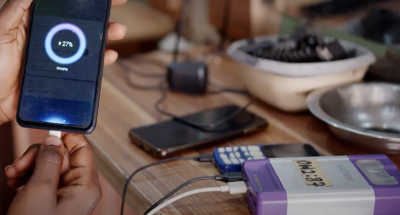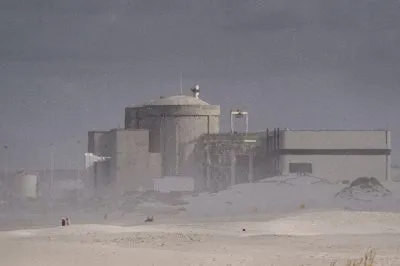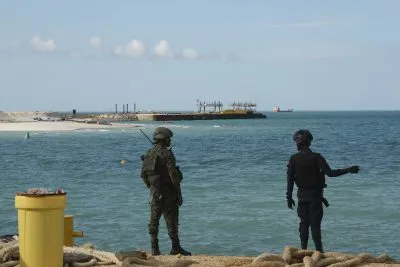Sitting in a courtyard a stone’s throw from the centre of Obuasi, a local gold buyer hammers a newly refined piece of gold from the nearby fire.
The piece, roughly the size of a £1 coin, is said to be worth 4,000 cedis (£736) yet it is an increasingly rare sight in the town that was once the epicentre of Ghana’s gold rush.
Hemmed in by verdant hills filled with the precious metal, Obuasi has been mining gold since the 17th century. But closure of its industrial mine and rising tensions between local miners and mine owners AngloGold Ashanti (AGA) – the world’s third largest producer – has left the town facing an uncertain future.
AGA has operated the mine, first opened in 1897, since 2004, but a global commodities slump and dwindling returns led to its closure in 2014 while efforts to purge illegal miners from AGA and other private land have left Obuasi in a state of industrial decline.
Small-scale miners in the town, 270km northwest of the capital Accra, wrote petitions to President John Mahama and protested in December over the government’s crackdown on small-scale mining.
Rufus Bory, secretary of Obuasi’s Small-Scale Miners’ Association, said then: “Our only crime is that we want to survive in a country where our government is unable to provide jobs for the teeming youth.
“Poverty is gradually killing the people of Obuasi so the government should act now by allowing the small-scale miners to work so that they can take care of their families.”
Unrest came to a head in February when AGA communications executive John Owusu was killed by a company vehicle as police and security forces tried to evict miners who had invaded an unapproved concession at the mine.
AGA says the presence of illegal miners worsened after the withdrawal of government military protection in February, and although military assistance has now returned illegal miners remain active on the site.
Local miners claim they have historical agreements to work certain unused concessions, but AGA denied that they had ever afforded concessions to small-scale miners.
On 9th March, AGA completed a deal, first started in 2013, to give 60% of its mining concessions to the Ghanaian government in a move which could benefit local miners, but some claim the land is of little value.
In April the Ashanti regional minister brought together a group of eminent locals to help find a solution to the situation, while in March the Minerals Commission announced fresh guidelines for artisanal and small-scale miners.
Restoring normality to Obuasi is heavily dependent on whether AGA can revive its ailing operation.
“Large numbers of illegal miners remain on site, and more continue to enter each day,” Eric Asubonteng, AGA’s head of operations in Obuasi, says. “If this continues … ongoing vandalism of our property will threaten the long-term viability of the mine and its contribution to Ghana’s economy.”
Feasibility study
In a “limited-operations phase” since the end of 2014, AGA is conducting a feasibility study to determine if the ageing mine can be redeveloped. Little action is expected however, while illegal miners continue to operate, and AGA says greater government support is needed.
A declining gold price since 2011, slumping from $2,000 per ounce to around $1,200 in April this year, coupled with ageing infrastructure and dwindling production volumes has hit the company hard.
Globally, AGA produced 3.9m ounces of gold in 2015, an 11% decrease on the previous year, and reports suggest its Obuasi operation has not delivered more than 400,000 ounces per year since 2004.
Randgold Resources pulled out of a joint venture to help redevelop Obuasi in December and AGA acknowledges the company is a “much-needed” contributor to the local economy, adding that other parties are interested in the operation.
“We are currently in the process of finalising the feasibility study and we are hopeful that the study would show acceptable long-term returns,” Asubonteng says.
“We intend to secure the necessary approvals and an investment agreement from governmental and regulatory authorities as soon as possible, in order to provide a certain investment environment.”
Above the courtyard in his shoebox-sized office, with weighing scales on the desk and a gold price list mounted to the wall, 27-year-old gold buyer, Papa Kujo, says many gold buyers and businesses have closed since the government crackdown and closure of the AGA mine.
“In Obuasi town they really depend on this business … I know rich people who have become poor.”
“The market people, the teachers, a lot of people were involved in the demonstration… [some] people forgot that those buying from their shops were often galamsey [artisanal gold miners] people. If you don’t want galamsey to go on then you don’t want your rice to be bought.”
The mine employed almost 10,000 workers in 1996. Today only a few hundred are left – all remaining non-essential staff were removed in February.
Devastation
One of those made redundant in 2014 was Christian Dunkwor, the former assistant chairman of Ghana’s Mine Workers’ Union. A mechanical technician for 17 years, he moved to Obuasi aged 13 when his father began working at the mine, and says its closing has devastated the town.
“When I was young Obuasi was very good, so many activities were going on,” the father of two explains. “Now Obuasi is not like what we used to see in those days, it has gone down totally.”
Dunkwor now works independently along with another ex-AGA employee.
“We had so many people from all over the country who came to work here but after the collapse all of them have gone,” he adds. “We are all hoping that one day God helps the company to come back.”
The mine’s closure and the troubles facing its small-scale miners have had a domino effect across the town and struggles are magnified at a time when Ghana is enduring economic difficulty, rising prices and unemployment.
Esta Anane, a vegetable trader in the town’s centre, says the mine closing is bad news for her and fellow traders.
“We will come here to sit in the sun all day and it is not easy…. all my friends they are all suffering,” the 54-year-old mother of six says.
“My husband doesn’t have work – I am looking after all the house. We need the mines and our husbands could get work. If they don’t open the mines, our husbands won’t get money.”
Papa Kujo says his business has decreased in recent times but he remains hopeful Ghana’s once thriving gold town can bounce back.
“People are really going through a lot, things were never really like this,” he says. “This is my grandfather’s business and my dad also worked here.
“Our business has really gone down but we are finding something small. In God’s own way he is providing for us. It hasn’t been good but we are praying and we know the better days are ahead.”
Chris Matthews
Want to continue reading? Subscribe today.
You've read all your free articles for this month! Subscribe now to enjoy full access to our content.
Digital Monthly
£8.00 / month
Receive full unlimited access to our articles, opinions, podcasts and more.
Digital Yearly
£70.00 / year
Our best value offer - save £26 and gain access to all of our digital content for an entire year!

 Sign in with Google
Sign in with Google 



